Contract Law & Corporations Act: Analyzing Liabilities and Issues
VerifiedAdded on 2023/06/12
|7
|2494
|416
Homework Assignment
AI Summary
This assignment provides detailed legal analysis of two problem questions. The first question examines Steve Jones' potential liability for breach of contract with Volvo Trucks and Thor Mining Machinery, focusing on pre-registration contracts and the implications of the Corporations Act 2001. It concludes that Steve is personally liable to Thor due to the pre-registration contract but not to Volvo. The second question assesses the validity of contracts made by Simon, a partner in Computer Solutions, with Sunstar Computer Hardware and You Beaut UTE Ltd, considering the partnership agreement and the Indoor Management Rule. It determines the enforceability of each contract based on Simon's authority and the third parties' knowledge and good faith. Desklib offers a range of similar solved assignments and past papers for students.
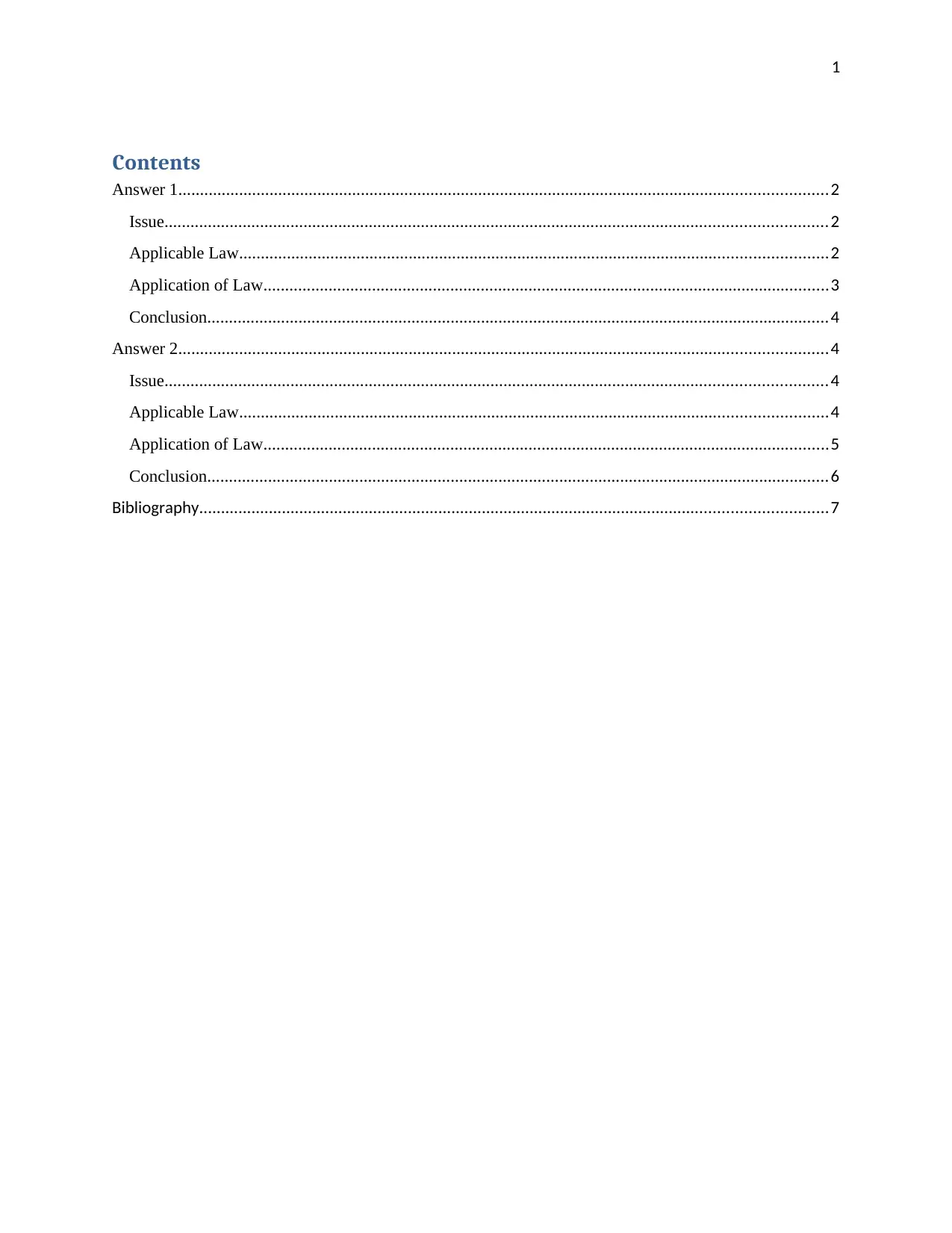
1
Contents
Answer 1.....................................................................................................................................................2
Issue........................................................................................................................................................2
Applicable Law.......................................................................................................................................2
Application of Law..................................................................................................................................3
Conclusion...............................................................................................................................................4
Answer 2.....................................................................................................................................................4
Issue........................................................................................................................................................4
Applicable Law.......................................................................................................................................4
Application of Law..................................................................................................................................5
Conclusion...............................................................................................................................................6
Bibliography................................................................................................................................................7
Contents
Answer 1.....................................................................................................................................................2
Issue........................................................................................................................................................2
Applicable Law.......................................................................................................................................2
Application of Law..................................................................................................................................3
Conclusion...............................................................................................................................................4
Answer 2.....................................................................................................................................................4
Issue........................................................................................................................................................4
Applicable Law.......................................................................................................................................4
Application of Law..................................................................................................................................5
Conclusion...............................................................................................................................................6
Bibliography................................................................................................................................................7
Paraphrase This Document
Need a fresh take? Get an instant paraphrase of this document with our AI Paraphraser
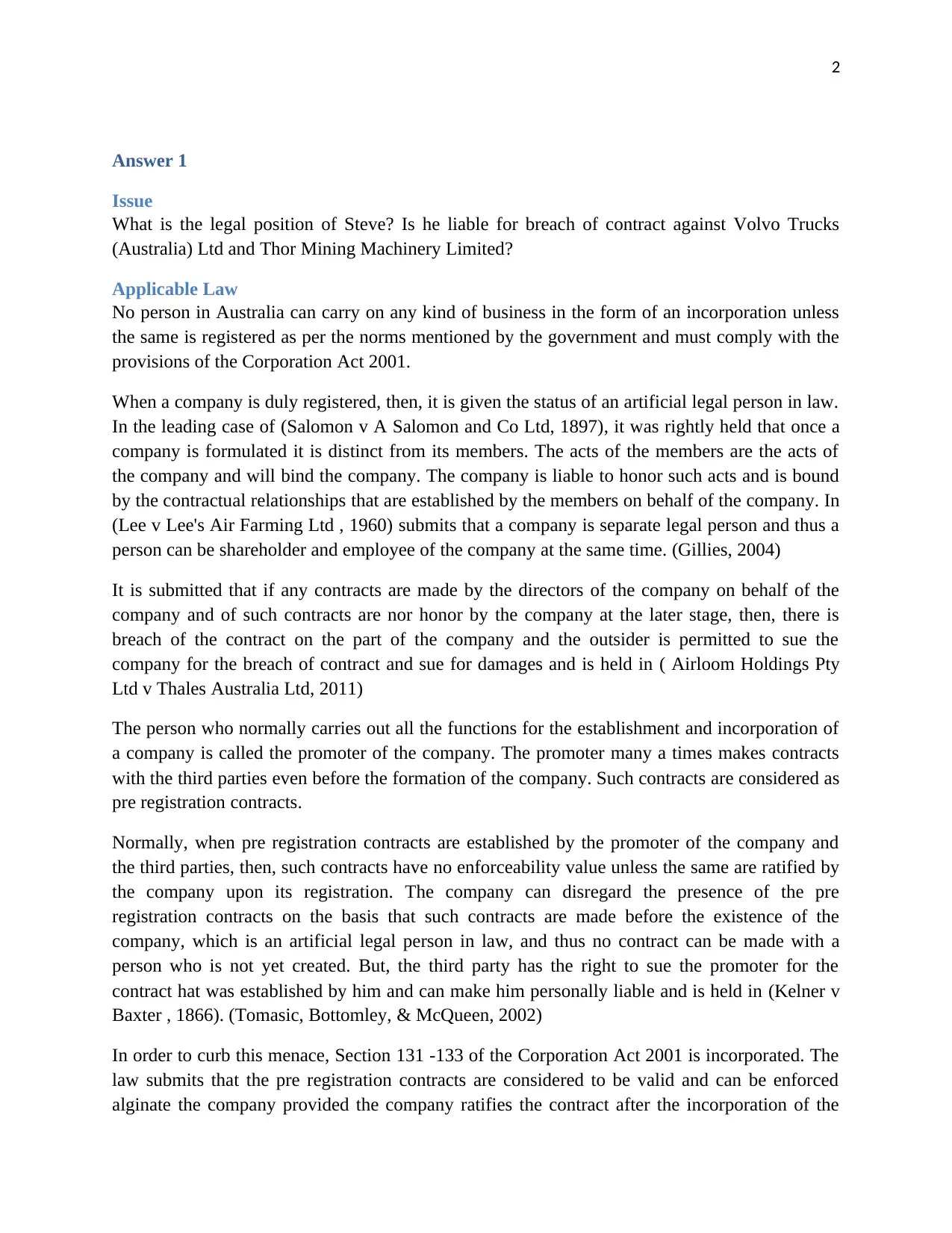
2
Answer 1
Issue
What is the legal position of Steve? Is he liable for breach of contract against Volvo Trucks
(Australia) Ltd and Thor Mining Machinery Limited?
Applicable Law
No person in Australia can carry on any kind of business in the form of an incorporation unless
the same is registered as per the norms mentioned by the government and must comply with the
provisions of the Corporation Act 2001.
When a company is duly registered, then, it is given the status of an artificial legal person in law.
In the leading case of (Salomon v A Salomon and Co Ltd, 1897), it was rightly held that once a
company is formulated it is distinct from its members. The acts of the members are the acts of
the company and will bind the company. The company is liable to honor such acts and is bound
by the contractual relationships that are established by the members on behalf of the company. In
(Lee v Lee's Air Farming Ltd , 1960) submits that a company is separate legal person and thus a
person can be shareholder and employee of the company at the same time. (Gillies, 2004)
It is submitted that if any contracts are made by the directors of the company on behalf of the
company and of such contracts are nor honor by the company at the later stage, then, there is
breach of the contract on the part of the company and the outsider is permitted to sue the
company for the breach of contract and sue for damages and is held in ( Airloom Holdings Pty
Ltd v Thales Australia Ltd, 2011)
The person who normally carries out all the functions for the establishment and incorporation of
a company is called the promoter of the company. The promoter many a times makes contracts
with the third parties even before the formation of the company. Such contracts are considered as
pre registration contracts.
Normally, when pre registration contracts are established by the promoter of the company and
the third parties, then, such contracts have no enforceability value unless the same are ratified by
the company upon its registration. The company can disregard the presence of the pre
registration contracts on the basis that such contracts are made before the existence of the
company, which is an artificial legal person in law, and thus no contract can be made with a
person who is not yet created. But, the third party has the right to sue the promoter for the
contract hat was established by him and can make him personally liable and is held in (Kelner v
Baxter , 1866). (Tomasic, Bottomley, & McQueen, 2002)
In order to curb this menace, Section 131 -133 of the Corporation Act 2001 is incorporated. The
law submits that the pre registration contracts are considered to be valid and can be enforced
alginate the company provided the company ratifies the contract after the incorporation of the
Answer 1
Issue
What is the legal position of Steve? Is he liable for breach of contract against Volvo Trucks
(Australia) Ltd and Thor Mining Machinery Limited?
Applicable Law
No person in Australia can carry on any kind of business in the form of an incorporation unless
the same is registered as per the norms mentioned by the government and must comply with the
provisions of the Corporation Act 2001.
When a company is duly registered, then, it is given the status of an artificial legal person in law.
In the leading case of (Salomon v A Salomon and Co Ltd, 1897), it was rightly held that once a
company is formulated it is distinct from its members. The acts of the members are the acts of
the company and will bind the company. The company is liable to honor such acts and is bound
by the contractual relationships that are established by the members on behalf of the company. In
(Lee v Lee's Air Farming Ltd , 1960) submits that a company is separate legal person and thus a
person can be shareholder and employee of the company at the same time. (Gillies, 2004)
It is submitted that if any contracts are made by the directors of the company on behalf of the
company and of such contracts are nor honor by the company at the later stage, then, there is
breach of the contract on the part of the company and the outsider is permitted to sue the
company for the breach of contract and sue for damages and is held in ( Airloom Holdings Pty
Ltd v Thales Australia Ltd, 2011)
The person who normally carries out all the functions for the establishment and incorporation of
a company is called the promoter of the company. The promoter many a times makes contracts
with the third parties even before the formation of the company. Such contracts are considered as
pre registration contracts.
Normally, when pre registration contracts are established by the promoter of the company and
the third parties, then, such contracts have no enforceability value unless the same are ratified by
the company upon its registration. The company can disregard the presence of the pre
registration contracts on the basis that such contracts are made before the existence of the
company, which is an artificial legal person in law, and thus no contract can be made with a
person who is not yet created. But, the third party has the right to sue the promoter for the
contract hat was established by him and can make him personally liable and is held in (Kelner v
Baxter , 1866). (Tomasic, Bottomley, & McQueen, 2002)
In order to curb this menace, Section 131 -133 of the Corporation Act 2001 is incorporated. The
law submits that the pre registration contracts are considered to be valid and can be enforced
alginate the company provided the company ratifies the contract after the incorporation of the
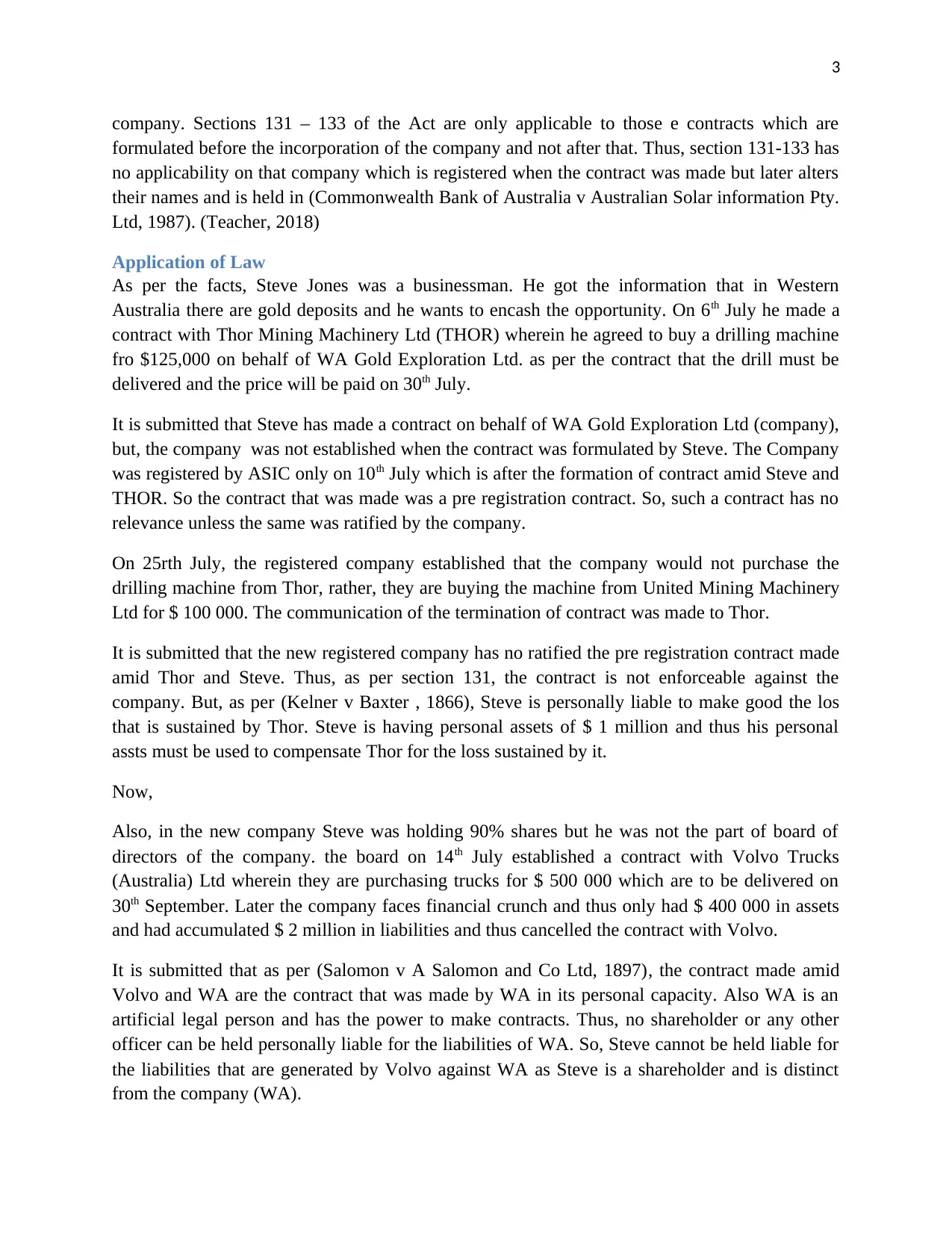
3
company. Sections 131 – 133 of the Act are only applicable to those e contracts which are
formulated before the incorporation of the company and not after that. Thus, section 131-133 has
no applicability on that company which is registered when the contract was made but later alters
their names and is held in (Commonwealth Bank of Australia v Australian Solar information Pty.
Ltd, 1987). (Teacher, 2018)
Application of Law
As per the facts, Steve Jones was a businessman. He got the information that in Western
Australia there are gold deposits and he wants to encash the opportunity. On 6th July he made a
contract with Thor Mining Machinery Ltd (THOR) wherein he agreed to buy a drilling machine
fro $125,000 on behalf of WA Gold Exploration Ltd. as per the contract that the drill must be
delivered and the price will be paid on 30th July.
It is submitted that Steve has made a contract on behalf of WA Gold Exploration Ltd (company),
but, the company was not established when the contract was formulated by Steve. The Company
was registered by ASIC only on 10th July which is after the formation of contract amid Steve and
THOR. So the contract that was made was a pre registration contract. So, such a contract has no
relevance unless the same was ratified by the company.
On 25rth July, the registered company established that the company would not purchase the
drilling machine from Thor, rather, they are buying the machine from United Mining Machinery
Ltd for $ 100 000. The communication of the termination of contract was made to Thor.
It is submitted that the new registered company has no ratified the pre registration contract made
amid Thor and Steve. Thus, as per section 131, the contract is not enforceable against the
company. But, as per (Kelner v Baxter , 1866), Steve is personally liable to make good the los
that is sustained by Thor. Steve is having personal assets of $ 1 million and thus his personal
assts must be used to compensate Thor for the loss sustained by it.
Now,
Also, in the new company Steve was holding 90% shares but he was not the part of board of
directors of the company. the board on 14th July established a contract with Volvo Trucks
(Australia) Ltd wherein they are purchasing trucks for $ 500 000 which are to be delivered on
30th September. Later the company faces financial crunch and thus only had $ 400 000 in assets
and had accumulated $ 2 million in liabilities and thus cancelled the contract with Volvo.
It is submitted that as per (Salomon v A Salomon and Co Ltd, 1897), the contract made amid
Volvo and WA are the contract that was made by WA in its personal capacity. Also WA is an
artificial legal person and has the power to make contracts. Thus, no shareholder or any other
officer can be held personally liable for the liabilities of WA. So, Steve cannot be held liable for
the liabilities that are generated by Volvo against WA as Steve is a shareholder and is distinct
from the company (WA).
company. Sections 131 – 133 of the Act are only applicable to those e contracts which are
formulated before the incorporation of the company and not after that. Thus, section 131-133 has
no applicability on that company which is registered when the contract was made but later alters
their names and is held in (Commonwealth Bank of Australia v Australian Solar information Pty.
Ltd, 1987). (Teacher, 2018)
Application of Law
As per the facts, Steve Jones was a businessman. He got the information that in Western
Australia there are gold deposits and he wants to encash the opportunity. On 6th July he made a
contract with Thor Mining Machinery Ltd (THOR) wherein he agreed to buy a drilling machine
fro $125,000 on behalf of WA Gold Exploration Ltd. as per the contract that the drill must be
delivered and the price will be paid on 30th July.
It is submitted that Steve has made a contract on behalf of WA Gold Exploration Ltd (company),
but, the company was not established when the contract was formulated by Steve. The Company
was registered by ASIC only on 10th July which is after the formation of contract amid Steve and
THOR. So the contract that was made was a pre registration contract. So, such a contract has no
relevance unless the same was ratified by the company.
On 25rth July, the registered company established that the company would not purchase the
drilling machine from Thor, rather, they are buying the machine from United Mining Machinery
Ltd for $ 100 000. The communication of the termination of contract was made to Thor.
It is submitted that the new registered company has no ratified the pre registration contract made
amid Thor and Steve. Thus, as per section 131, the contract is not enforceable against the
company. But, as per (Kelner v Baxter , 1866), Steve is personally liable to make good the los
that is sustained by Thor. Steve is having personal assets of $ 1 million and thus his personal
assts must be used to compensate Thor for the loss sustained by it.
Now,
Also, in the new company Steve was holding 90% shares but he was not the part of board of
directors of the company. the board on 14th July established a contract with Volvo Trucks
(Australia) Ltd wherein they are purchasing trucks for $ 500 000 which are to be delivered on
30th September. Later the company faces financial crunch and thus only had $ 400 000 in assets
and had accumulated $ 2 million in liabilities and thus cancelled the contract with Volvo.
It is submitted that as per (Salomon v A Salomon and Co Ltd, 1897), the contract made amid
Volvo and WA are the contract that was made by WA in its personal capacity. Also WA is an
artificial legal person and has the power to make contracts. Thus, no shareholder or any other
officer can be held personally liable for the liabilities of WA. So, Steve cannot be held liable for
the liabilities that are generated by Volvo against WA as Steve is a shareholder and is distinct
from the company (WA).
⊘ This is a preview!⊘
Do you want full access?
Subscribe today to unlock all pages.

Trusted by 1+ million students worldwide
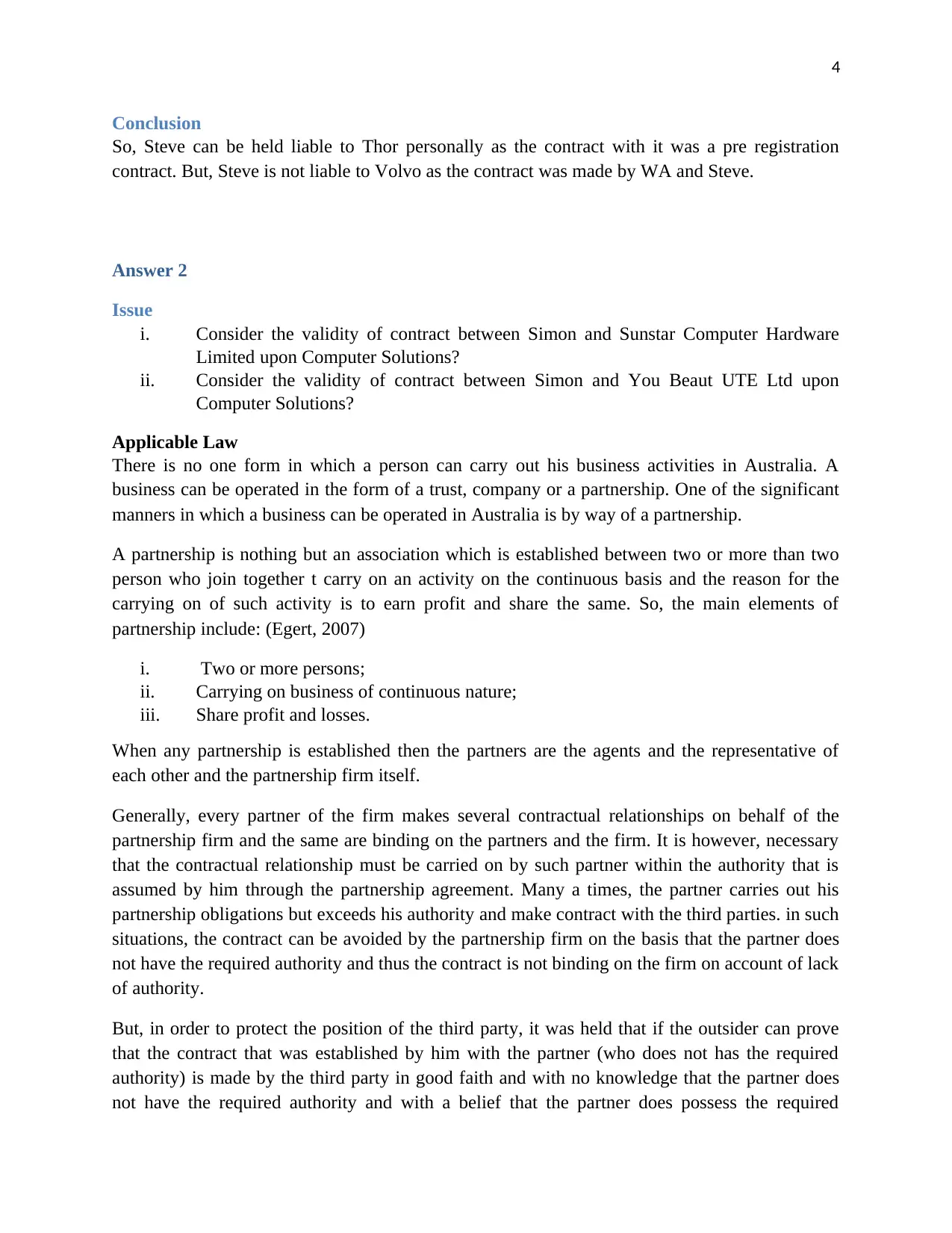
4
Conclusion
So, Steve can be held liable to Thor personally as the contract with it was a pre registration
contract. But, Steve is not liable to Volvo as the contract was made by WA and Steve.
Answer 2
Issue
i. Consider the validity of contract between Simon and Sunstar Computer Hardware
Limited upon Computer Solutions?
ii. Consider the validity of contract between Simon and You Beaut UTE Ltd upon
Computer Solutions?
Applicable Law
There is no one form in which a person can carry out his business activities in Australia. A
business can be operated in the form of a trust, company or a partnership. One of the significant
manners in which a business can be operated in Australia is by way of a partnership.
A partnership is nothing but an association which is established between two or more than two
person who join together t carry on an activity on the continuous basis and the reason for the
carrying on of such activity is to earn profit and share the same. So, the main elements of
partnership include: (Egert, 2007)
i. Two or more persons;
ii. Carrying on business of continuous nature;
iii. Share profit and losses.
When any partnership is established then the partners are the agents and the representative of
each other and the partnership firm itself.
Generally, every partner of the firm makes several contractual relationships on behalf of the
partnership firm and the same are binding on the partners and the firm. It is however, necessary
that the contractual relationship must be carried on by such partner within the authority that is
assumed by him through the partnership agreement. Many a times, the partner carries out his
partnership obligations but exceeds his authority and make contract with the third parties. in such
situations, the contract can be avoided by the partnership firm on the basis that the partner does
not have the required authority and thus the contract is not binding on the firm on account of lack
of authority.
But, in order to protect the position of the third party, it was held that if the outsider can prove
that the contract that was established by him with the partner (who does not has the required
authority) is made by the third party in good faith and with no knowledge that the partner does
not have the required authority and with a belief that the partner does possess the required
Conclusion
So, Steve can be held liable to Thor personally as the contract with it was a pre registration
contract. But, Steve is not liable to Volvo as the contract was made by WA and Steve.
Answer 2
Issue
i. Consider the validity of contract between Simon and Sunstar Computer Hardware
Limited upon Computer Solutions?
ii. Consider the validity of contract between Simon and You Beaut UTE Ltd upon
Computer Solutions?
Applicable Law
There is no one form in which a person can carry out his business activities in Australia. A
business can be operated in the form of a trust, company or a partnership. One of the significant
manners in which a business can be operated in Australia is by way of a partnership.
A partnership is nothing but an association which is established between two or more than two
person who join together t carry on an activity on the continuous basis and the reason for the
carrying on of such activity is to earn profit and share the same. So, the main elements of
partnership include: (Egert, 2007)
i. Two or more persons;
ii. Carrying on business of continuous nature;
iii. Share profit and losses.
When any partnership is established then the partners are the agents and the representative of
each other and the partnership firm itself.
Generally, every partner of the firm makes several contractual relationships on behalf of the
partnership firm and the same are binding on the partners and the firm. It is however, necessary
that the contractual relationship must be carried on by such partner within the authority that is
assumed by him through the partnership agreement. Many a times, the partner carries out his
partnership obligations but exceeds his authority and make contract with the third parties. in such
situations, the contract can be avoided by the partnership firm on the basis that the partner does
not have the required authority and thus the contract is not binding on the firm on account of lack
of authority.
But, in order to protect the position of the third party, it was held that if the outsider can prove
that the contract that was established by him with the partner (who does not has the required
authority) is made by the third party in good faith and with no knowledge that the partner does
not have the required authority and with a belief that the partner does possess the required
Paraphrase This Document
Need a fresh take? Get an instant paraphrase of this document with our AI Paraphraser
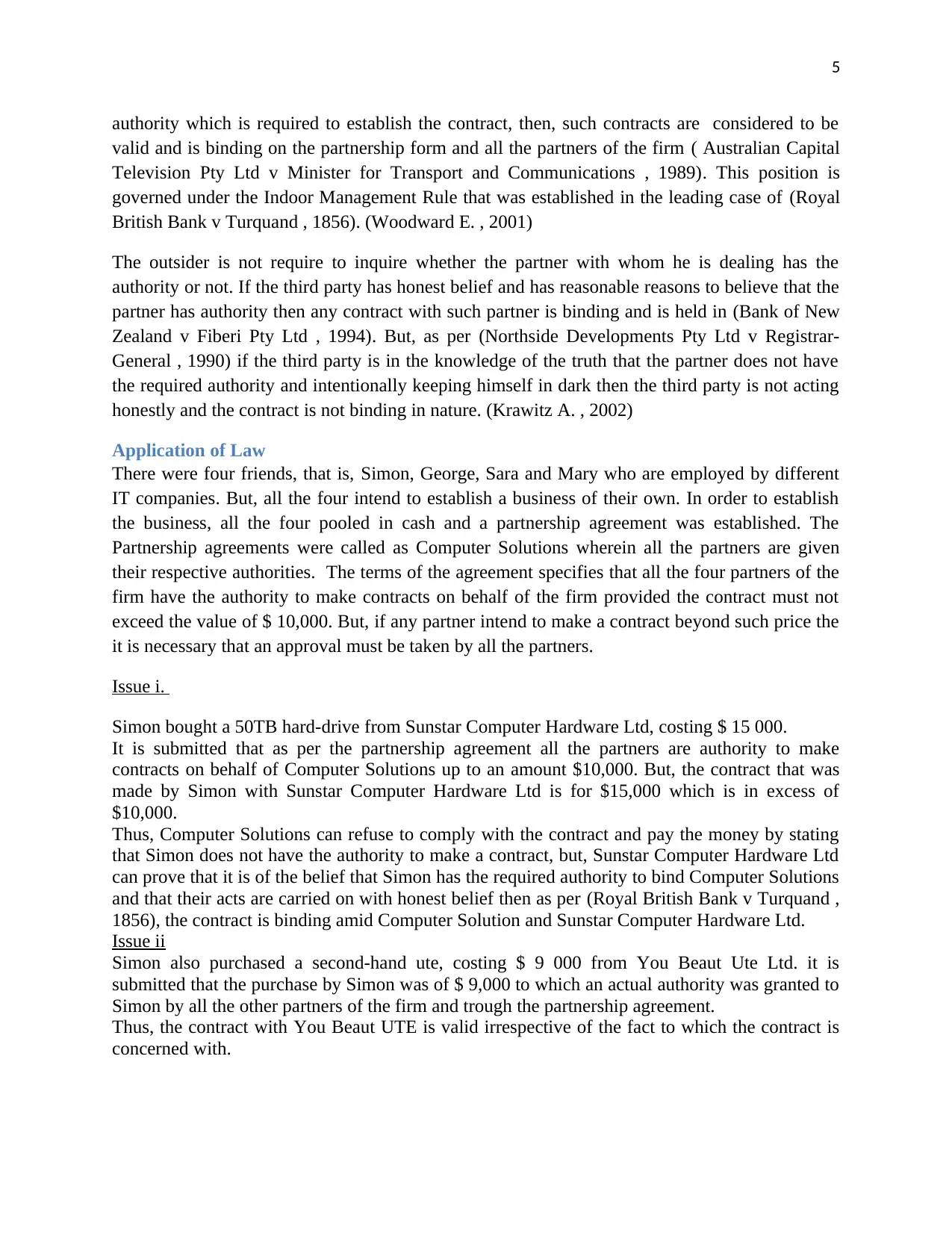
5
authority which is required to establish the contract, then, such contracts are considered to be
valid and is binding on the partnership form and all the partners of the firm ( Australian Capital
Television Pty Ltd v Minister for Transport and Communications , 1989). This position is
governed under the Indoor Management Rule that was established in the leading case of (Royal
British Bank v Turquand , 1856). (Woodward E. , 2001)
The outsider is not require to inquire whether the partner with whom he is dealing has the
authority or not. If the third party has honest belief and has reasonable reasons to believe that the
partner has authority then any contract with such partner is binding and is held in (Bank of New
Zealand v Fiberi Pty Ltd , 1994). But, as per (Northside Developments Pty Ltd v Registrar-
General , 1990) if the third party is in the knowledge of the truth that the partner does not have
the required authority and intentionally keeping himself in dark then the third party is not acting
honestly and the contract is not binding in nature. (Krawitz A. , 2002)
Application of Law
There were four friends, that is, Simon, George, Sara and Mary who are employed by different
IT companies. But, all the four intend to establish a business of their own. In order to establish
the business, all the four pooled in cash and a partnership agreement was established. The
Partnership agreements were called as Computer Solutions wherein all the partners are given
their respective authorities. The terms of the agreement specifies that all the four partners of the
firm have the authority to make contracts on behalf of the firm provided the contract must not
exceed the value of $ 10,000. But, if any partner intend to make a contract beyond such price the
it is necessary that an approval must be taken by all the partners.
Issue i.
Simon bought a 50TB hard-drive from Sunstar Computer Hardware Ltd, costing $ 15 000.
It is submitted that as per the partnership agreement all the partners are authority to make
contracts on behalf of Computer Solutions up to an amount $10,000. But, the contract that was
made by Simon with Sunstar Computer Hardware Ltd is for $15,000 which is in excess of
$10,000.
Thus, Computer Solutions can refuse to comply with the contract and pay the money by stating
that Simon does not have the authority to make a contract, but, Sunstar Computer Hardware Ltd
can prove that it is of the belief that Simon has the required authority to bind Computer Solutions
and that their acts are carried on with honest belief then as per (Royal British Bank v Turquand ,
1856), the contract is binding amid Computer Solution and Sunstar Computer Hardware Ltd.
Issue ii
Simon also purchased a second-hand ute, costing $ 9 000 from You Beaut Ute Ltd. it is
submitted that the purchase by Simon was of $ 9,000 to which an actual authority was granted to
Simon by all the other partners of the firm and trough the partnership agreement.
Thus, the contract with You Beaut UTE is valid irrespective of the fact to which the contract is
concerned with.
authority which is required to establish the contract, then, such contracts are considered to be
valid and is binding on the partnership form and all the partners of the firm ( Australian Capital
Television Pty Ltd v Minister for Transport and Communications , 1989). This position is
governed under the Indoor Management Rule that was established in the leading case of (Royal
British Bank v Turquand , 1856). (Woodward E. , 2001)
The outsider is not require to inquire whether the partner with whom he is dealing has the
authority or not. If the third party has honest belief and has reasonable reasons to believe that the
partner has authority then any contract with such partner is binding and is held in (Bank of New
Zealand v Fiberi Pty Ltd , 1994). But, as per (Northside Developments Pty Ltd v Registrar-
General , 1990) if the third party is in the knowledge of the truth that the partner does not have
the required authority and intentionally keeping himself in dark then the third party is not acting
honestly and the contract is not binding in nature. (Krawitz A. , 2002)
Application of Law
There were four friends, that is, Simon, George, Sara and Mary who are employed by different
IT companies. But, all the four intend to establish a business of their own. In order to establish
the business, all the four pooled in cash and a partnership agreement was established. The
Partnership agreements were called as Computer Solutions wherein all the partners are given
their respective authorities. The terms of the agreement specifies that all the four partners of the
firm have the authority to make contracts on behalf of the firm provided the contract must not
exceed the value of $ 10,000. But, if any partner intend to make a contract beyond such price the
it is necessary that an approval must be taken by all the partners.
Issue i.
Simon bought a 50TB hard-drive from Sunstar Computer Hardware Ltd, costing $ 15 000.
It is submitted that as per the partnership agreement all the partners are authority to make
contracts on behalf of Computer Solutions up to an amount $10,000. But, the contract that was
made by Simon with Sunstar Computer Hardware Ltd is for $15,000 which is in excess of
$10,000.
Thus, Computer Solutions can refuse to comply with the contract and pay the money by stating
that Simon does not have the authority to make a contract, but, Sunstar Computer Hardware Ltd
can prove that it is of the belief that Simon has the required authority to bind Computer Solutions
and that their acts are carried on with honest belief then as per (Royal British Bank v Turquand ,
1856), the contract is binding amid Computer Solution and Sunstar Computer Hardware Ltd.
Issue ii
Simon also purchased a second-hand ute, costing $ 9 000 from You Beaut Ute Ltd. it is
submitted that the purchase by Simon was of $ 9,000 to which an actual authority was granted to
Simon by all the other partners of the firm and trough the partnership agreement.
Thus, the contract with You Beaut UTE is valid irrespective of the fact to which the contract is
concerned with.

6
Conclusion
The contract with Simon and Sunstar Computer Hardware Limited is valid as the same can be
proved by applying the Indoor Management Rule. Also, the contract amid Simon and You Beaut
UTE Ltd is also valid as the same is within the actual authority of Simon.
Conclusion
The contract with Simon and Sunstar Computer Hardware Limited is valid as the same can be
proved by applying the Indoor Management Rule. Also, the contract amid Simon and You Beaut
UTE Ltd is also valid as the same is within the actual authority of Simon.
⊘ This is a preview!⊘
Do you want full access?
Subscribe today to unlock all pages.

Trusted by 1+ million students worldwide
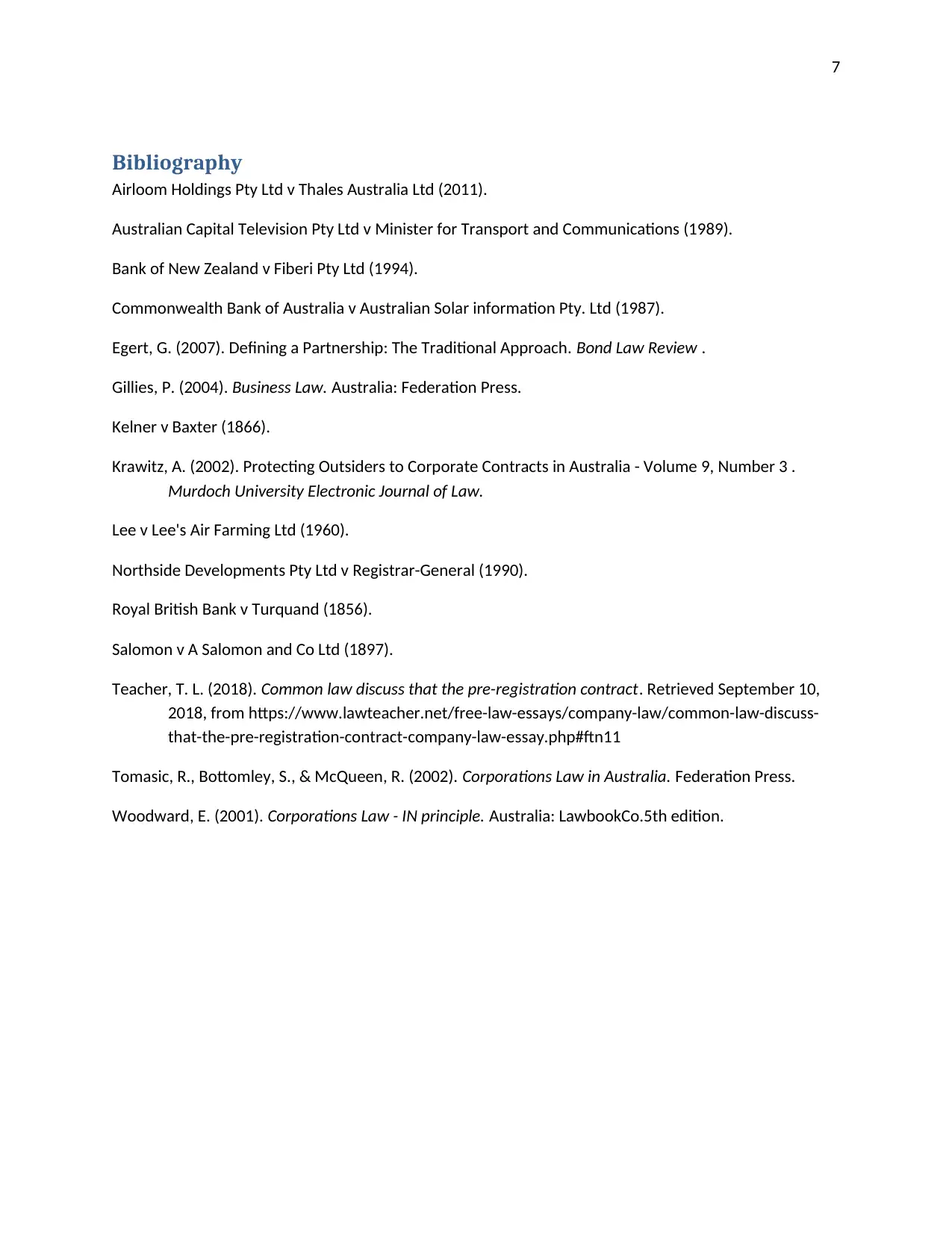
7
Bibliography
Airloom Holdings Pty Ltd v Thales Australia Ltd (2011).
Australian Capital Television Pty Ltd v Minister for Transport and Communications (1989).
Bank of New Zealand v Fiberi Pty Ltd (1994).
Commonwealth Bank of Australia v Australian Solar information Pty. Ltd (1987).
Egert, G. (2007). Defining a Partnership: The Traditional Approach. Bond Law Review .
Gillies, P. (2004). Business Law. Australia: Federation Press.
Kelner v Baxter (1866).
Krawitz, A. (2002). Protecting Outsiders to Corporate Contracts in Australia - Volume 9, Number 3 .
Murdoch University Electronic Journal of Law.
Lee v Lee's Air Farming Ltd (1960).
Northside Developments Pty Ltd v Registrar-General (1990).
Royal British Bank v Turquand (1856).
Salomon v A Salomon and Co Ltd (1897).
Teacher, T. L. (2018). Common law discuss that the pre-registration contract. Retrieved September 10,
2018, from https://www.lawteacher.net/free-law-essays/company-law/common-law-discuss-
that-the-pre-registration-contract-company-law-essay.php#ftn11
Tomasic, R., Bottomley, S., & McQueen, R. (2002). Corporations Law in Australia. Federation Press.
Woodward, E. (2001). Corporations Law - IN principle. Australia: LawbookCo.5th edition.
Bibliography
Airloom Holdings Pty Ltd v Thales Australia Ltd (2011).
Australian Capital Television Pty Ltd v Minister for Transport and Communications (1989).
Bank of New Zealand v Fiberi Pty Ltd (1994).
Commonwealth Bank of Australia v Australian Solar information Pty. Ltd (1987).
Egert, G. (2007). Defining a Partnership: The Traditional Approach. Bond Law Review .
Gillies, P. (2004). Business Law. Australia: Federation Press.
Kelner v Baxter (1866).
Krawitz, A. (2002). Protecting Outsiders to Corporate Contracts in Australia - Volume 9, Number 3 .
Murdoch University Electronic Journal of Law.
Lee v Lee's Air Farming Ltd (1960).
Northside Developments Pty Ltd v Registrar-General (1990).
Royal British Bank v Turquand (1856).
Salomon v A Salomon and Co Ltd (1897).
Teacher, T. L. (2018). Common law discuss that the pre-registration contract. Retrieved September 10,
2018, from https://www.lawteacher.net/free-law-essays/company-law/common-law-discuss-
that-the-pre-registration-contract-company-law-essay.php#ftn11
Tomasic, R., Bottomley, S., & McQueen, R. (2002). Corporations Law in Australia. Federation Press.
Woodward, E. (2001). Corporations Law - IN principle. Australia: LawbookCo.5th edition.
1 out of 7
Related Documents
Your All-in-One AI-Powered Toolkit for Academic Success.
+13062052269
info@desklib.com
Available 24*7 on WhatsApp / Email
![[object Object]](/_next/static/media/star-bottom.7253800d.svg)
Unlock your academic potential
Copyright © 2020–2025 A2Z Services. All Rights Reserved. Developed and managed by ZUCOL.



